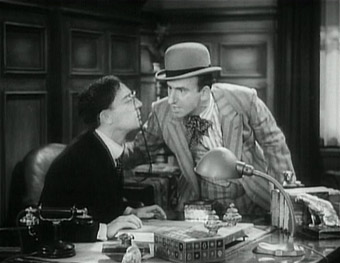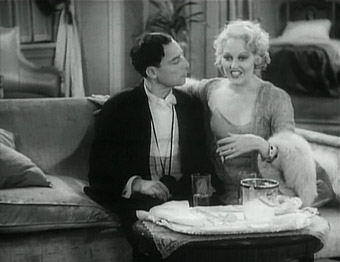|
Keaton speaks! Another illusion shattered. Of course, hearing any performer who made their name in the silent era delivering dialogue is usually a bit of a jolt, but in the case of Buster Keaton, a comedian who was best known for his stone-faced lack of expression, it feels borderline peculiar.
Of course, this is not really the surprise I'm making it out to be – Keaton continued to make films and TV shows long after the passing of silent cinema, and even had a memorable speaking role in his final film, as Erronius in Richard Lester's feature version of A Funny Thing Happened on the Way to the Forum. Speak Easily was one of his earliest sound films, one of his first with new studio MGM, and the second in which he was teamed with ex-vaudeville and radio singer and comedian Jimmy Durante, a performer whose appeal I'm perhaps of the wrong generation to ever appreciate. But the problem with the film is not that it has a soundtrack or that Keaton is required to share the leading role, it's that it's not that funny. At times it's really not funny. This, combined with the creative stranglehold being exerted by his new studio contract and a string of problems in his private life, effectively marked the end of Buster's reign as one of the greatest of all movie comedians. But in spite of some harsh criticisms of the film you'll find elsewhere, it's not all bad news. I'll get to why in a minute.

Buster plays bookish college professor Timoleon Zanders Post, a man inexperienced in the ways of women and the world in general, which his academic assistant thinks it's about time he did something about. So when he comes into a large and unexpected inheritance, he packs his bag and is on his way, and in no time has hooked up with a third-rate touring show run by Jimmy Dodge (Jimmy Durante), where he becomes entranced by pretty dancer Pansy Peets (Ruth Selwyn). Unaware that the news of the inheritance was faked as an incentive to get him out from behind his desk, Post agrees to bankroll the show's move to Broadway, something that immediately attracts the attention of gold-digging performer Eleanor Espere (Thelma Todd).
It's a standard backstage musical-comedy plot of the period, and like its contemporaries it swims or sinks not on its narrative originality, but the quality and entertainment value of its component parts, and for me that's where the problem lies. It gets off to a particularly shaky start, with some sparkle-free dialogue between Post and his assistant that is peppered with the sort of pauses that suggest they're both struggling to remember their lines. Once Post is on the road he's like an innocent pedant, bemused by slang, misinterpreting almost everything that's said to him, and correcting people on small details of their speech. If you can imagine Star Trek's android Data in his early days let loose in 30s America then you'll have an idea, but it's a comedy concept let down by a script in need of a wit injection (trying to discuss finances with Post, Dodge lists every contemporary term for money except, well, "money," and then becomes frustrated by the professor's bemusement).
Intermittently there are signs of better things, with a limp and extended gag about left luggage and a lost baby concluding in a very Keaton-esque stunt in which he is dragged behind a train as it pulls away, and the variety show put on by Dodge and his crew is just tawdry enough to make the point without overplaying it (that the few audience members who stuck it out depart grumpily the very second it ends is a nice touch). The idea that Dodge has to rapidly and repeatedly run between banging out a piano accompaniment and performing on stage also rings true.
From here on this is pretty much how it plays right up to the chaotic but somehow uninspired finale, in which accidental on-stage buffoonery is mistaken for comedy gold, at least by the theatre audience. It's a concept that does, on paper at least, prefigure the climax of The Producers – oh, that the shenanigans here were half as inspired as Springtime for Hitler. And in the manner of these things, logic plays little part, with no-one involved giving a thought to how they are going to get a man who is unaware he was even performing in the first place to reproduce on a daily basis the series of chance mishaps that so wowed the audience on opening night.

But if as a whole Speak Easily leaves you groaning for what could have been, there's a scene nestled midway that scores a small comedy bulls-eye, one in which Post and the scheming Eleanor get drunk at her apartment. Some inspired physical comedy (Post's first attempt to pick the drunk Eleanor up seems to bend her in half) alternate with some of the funniest drunk acting I can readily recall, with Keaton responding to Thelma Todd's hilarious, almost indecipherable high-pitched prattle with a stony, "I don't understand you." It's also here that Keaton's vocal delivery is at its best, suggesting that with the right script he could have made that transition after all. "Have you ever seriously considered marriage?" coos Eleanor as she makes her first serious moves on him. "Yes," he says in all seriousness. "That's why I'm single."
Framed at 1.30:1 and standards converted from an NTSC master, the transfer here is surprisingly impressive. Some dust and a few scratches from the film print remain, especially near the reel changes (the markers are present), but the contrast and black levels are very good and there's a pleasing level of detail in the picture – a clean-up or restoration has clearly taken place somewhere along the line.
The mono soundtrack may have the expected limitations on dynamic range, but like the picture appears to have been nicely cleaned up, resulting in a clearer soundtrack than you might expect, despite the odd pop here and there.
None. Always a shame with Keaton.
Not the sort of film you'd use to introduce newcomers to the cinema of Buster Keaton, Speak Easily may not be that great – and it really isn't – but it's certainly not as bad as some commentators have claimed, and that drunk scene almost makes it worth plodding through the preceding stuff to get to. Almost. Should still be of interest to Keaton aficionados – the disc may lack extras, but the transfer is fine.
|